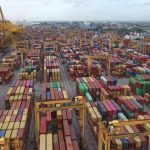A national training focused on enhancing port facility security was completed in Aden, Yemen (14-16 January), as part of the EU-funded Regional Programme for Maritime Security in the Red Sea Area (Red Sea Project).
The training, led by IMO, takes aim at ongoing threats to maritime security in the region, such as terrorism, piracy and transnational crime. Since November 2023, the Red Sea area has also become a danger zone due to attacks on international shipping linked to wider geopolitical tensions.
Representatives from the Department of Maritime Affairs Administration, the Port Authority, law enforcement agencies and other stakeholders joined the workshop. It is the latest in a series of targeted activities implemented by IMO under the Red Sea Project to strengthen security in the port of Aden.
After carrying out port facilities’ security assessments, the focus of this session was on the the design and implementation of Port Facility Security Plans (PFSPs). These plans detail the measures to be taken to address identified risks and minimize the potential for security breaches in the port, in addition to defining the roles and responsibilities of various agencies and security personnel.
The training examined the special measures outlined in SOLAS Chapter XI-2 and the ISPS Code and related guidance to enhance maritime security. Participants identified the investments required for port infrastructure upgrades, training, equipment, and technical resources to counter threats identified during Port Facility Security Assessments. They explored the establishment of Port Security Committees, in line with the IMO/ILO Code of Practice on security in ports.
Discussions stressed the importance of inter-agency cooperation and the role of security as a cornerstone for maritime development in Yemen and the wider Red Sea region.
The workshop took place under the framework of the Red Sea Project, which is funded by the European Union, and delivered through coordinated actions by IMO, the International Criminal Police Organization (INTERPOL), the United Nations Office on Drugs and Crime (UNODC), and the Intergovernmental Authority on Development (IGAD), in support of the participating countries: Djibouti, Ethiopia, Somalia, Sudan, and Yemen.
Source: IMO




